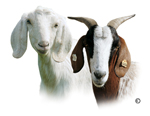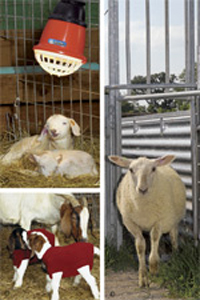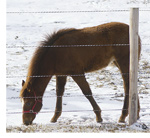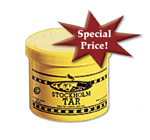Message from the Owner
How global forces are impacting you & your farm
Economically these 2 changes are tsunami's that will "wash" over your personal world. Specific things to expect & why
These predictions will be impacted up or down by these less predictable factors:
by Stan Potratz Special Price from Premier!
Stockholm Pine Tar
|
 |
Current health issues facing goats
by Dr. Nathan Peterson, Mahaska Veterinary Clinic, raises goats in Oskaloosa, Iowa.
Diseases associated with feed consumption:
Acidosis: rumen pH altered by excessive grain intake; uncomfortable, grind teeth, stagger; treat with bicarbonate (baking soda, Pepto-Bismol).
Bloat: excessive froth or air build up in rumen; increase in grain or green, leafy alfalfa; relieve bloat by tubing and/or drench with therabloat.
Mycotoxins: toxin produced by corn, or hay, infected with certain fungus; effects liver the most; can cause bloat, acidosis, laminitis, death.
Pregnancy Toxemia: same as in sheep-does with multiple fetuses late in gestation with insufficient energy uptake. Does go off feed, grind teeth, recumbant. Treat with IV glucose, propylene glycol, Magic (corn oil, molasses, karo syrup), Vit-B, and possibly removal of fetuses.
Urinary Calculi: usually males straining to urinate, paw at ground, grind teeth. Related to Ca:P ratio in feed, and urinary pH. (high concentrates: low roughage). Prevent with urine acidifiers (ammonium chloride).
White Muscle Disease: Vit. E and Selenium deficiency: directly related to the soil the forage is grown in; weak, lethargic, stiff, newborns may be born dead, retained placentas: easy to supplement in feed, mineral, water, or injectable at any time; newborns receive Bo-Se.
Infectious diseases:
Caprine Arthritis-Encephalitis: virus causing arthritis in goats > 6 mo. and encephalitis in kids 1 - 4 mos. of age. Can also cause interstitial pneumonia & mastitis. Transmission through milk, doe to doe, needles. Serology test and cull if positive. No treatment.
Caseous Lymphadenitits: (Coynebacterium psuedotuberculosis) bacterial abscesses located in the skin and can disseminate throughout the viscera. Pus is highly contagious to sheep and goats. Diagnosed via serology test and culture. Treat through lancing and flushing abscess or formalin injections.
Enterotoxemia: (Clostridium Perfringens Type C, D) bacterial disease causing acute bloody diarrhea; type C < 3 weeks old, type D > 3 weeks old (feeders). Treat with antitoxin and penicillin. Bottle babies seem more prone.
Floppy Kid Syndrome: metabolic acidosis causing weakness, paralysis at 3 - 10 days of age. Unknown etiology. Treat with bicarb (baking soda/Pepto-Bismol) and oral penicillin
Footrot: (Fusobacterium necrophorum) trim feet, KoperTox, Tetracycline.
Johne's: bacterial disease (Mycobacterium psuedotuberculosis) common to dairy cows, producing chronic diarrhea & wasting disease. No treatment. Fecal culture is the gold standard but still is not 100%. Test & eliminate.
Pinkeye: reddened and inflamed conjunctiva; multiple entities (Chlamydia, Moraxella, Branhemella); Treat with Tetracycline and decrease exposure to dust, sunlight, flies, weeds.
Sore Mouth: Viral infection causing sores on mouth, nose, eyes, udder, vulva. Very contagious, humans too (Orf); not life threatening unless kids starve themselves to death or if the dam doesn't let kids nurse; vaccine available, but may not work.
Tetanus: Use C/D-T vaccine. May need to use Antitoxin only lasts 2 - 3 wks. 300 IU per head (5 doses per 1500 IU bottle).
Thiamine Deficiency: blind, star-gazing, and 'dizzy' goats at 2 - 6 mo. old, can also affect older goats caused by decreased thiamine production. Treat with IV thiamine, SQ Vit-B, and penicillin. REPEAT! REPEAT AGAIN!
Diseases that cause pneumonia:
P. Multocida/M. Haemolytica
Mycoplasma sp.
CAE
Diseases that cause abortions:
Brocellosis
Chlamydia
Leptospirosis
Campylobacter (vibrio)
Toxoplasmosis
Parasites:
Coccidiosis: diarrhea +/- blood at 1 - 4 mos. of age; stressful situations bring on signs.
Heamonchus Contortus: "Barberpole worm"- most significant stomach worm; bloodsucking causing anemia and death.
Tapeworms: Mites are intermediate hosts; problem of goats?
Mange:
- Sarcoptic mange: reportable zoonotic disease.
- Chorioptic mange: host-specific mite causing patchy hair loss; 21 day life cycle, but can live 3 - 4 mo. in bedding. Treat with pyrethrins, not ivomecs.
Note: We at Premier are not veterinarians and strongly suggest that you contact your veterinarian when questioning an illness in your animals!
New Products From Premier!
 |
2008 New Products
- High quality hot-dip galv. steel handling eqpt. for less $$ than painted eqpt.
- Handling Equipment-taller (45") panels and extensions.
- Wide range of livestock treatments.
- Low-cost reusable covers save kids/lambs from cold and wet.
- Heat lamps that please and are easy to use.
- Winter water solutions: 16 gal. Heated Tub, Pet Bowl and ThermoCube.
- Customized neck tags for goats and sheep.
- For identification-ear notcher.
- Extra books & DVD's.
- Latex gloves-wider range of sizes.
Click the links below to see our new 2008 products:
Clippers and Shears
Ear Tags and Tattoo Supplies
Equipment
Note: Premier's catalog is mailing early October 2007.
Premier Tip
 Horse fence in the winter months can be easily converted to a Pos/Neg system if needed. |
Electric Fence
with two or more lines in the winter with
snow and ice
If you live in an area prone to having snow in the winter, snow acts as an insulator. It is suggested to have the fence lines connected on one end, so that during winter months it can easily be made into a Pos/Neg fence by disconnecting every other hot line and connecting to a ground.
The rest of the year you can go back to having all lines hot if needed.
If you have an ice storm and your fence lines are covered with ice the animals might not receive a good shock. One way to get ice off the fence is to give the fence a good shake, this will help break up the ice.
You will need to check the fence often during the winter months.
For more fencing needs from Premier click here.
Premier Employee Spotlight
 |
Carl McCall
This month's featured employee is Carl McCall of rural Washington County. He has been the shepherd here at Premier for 10 years. The very best part about his position he says is "getting to test new products and reporting back how well an item does or doesn't work in the field. I also enjoy helping to take pictures for the catalogs." He continues that the best part about Premier "is the coworkers. They are the absolute best. Also taking care of the ewes and lambs at lambing is an exciting time."
Carl and his wife Kelly have three children, a son Jason (20) and twin girls Heather and Holly (18). He farms 600 acres of corn and soybeans and has 100 head of sheep, mostly suffolk cross ewes. He is an avid hunter, a member of Pheasants Forever and a dye-hard Iowa Hawkeyes Football fan. His favorite statement is "you never know when your time is up - so eat dessert first."
Recipe
Poor Man's Turtles
Ingredients:
1 bag Rolo's
1 bag mini pretzels
1 bag pecan halves or walnut meats
Put waxed paper on a cookie sheet and then lay mini pretzels on the waxed paper.
Place a Rolo on top of each pretzel. Put the cookie sheet in a 350 degree oven for 1 - 2 min. (watch carefully).
Take out of oven and lightly press pecan halves or walnuts in the center of each Rolo.
Cool and store in a covered container.



